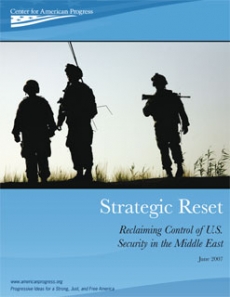
Strategic Reset: Reclaiming Control of U.S. Security in the Middle East
With the Iraq war well into its fifth year, the Bush administration still lacks a realistic plan for the Middle East and Iraq. The United States must reclaim control of its core national security interests by taking active steps to stabilize the entire Middle East and abandon the delusions at the heart of President Bush’s policies. Otherwise, U.S. security will continue to suffer by weakening the U.S. military and draining resources away from destroying terrorist networks such as Al Qaeda.
The current Iraq strategy is exactly what Al Qaeda wants—the United States distracted and pinned down by Iraq’s internal confl icts and trapped in a quagmire that has become the perfect rallying cry and recruitment tool for Al Qaeda. The United States has no good options given the strategic and tactical mistakes made on Iraq since 2002, but simply staying the course with an indefi nite military presence is not advancing U.S. interests...
CONTENTS
1/ INTRODUCTION AND SUMMARY
10 / ACCEPTING THE REALITY OF IRAQ’S FRAGMENTATION
10 / Adjusting to the Realities of Iraq’s National Political Stalemate
13 / Phase Out Unconditional Training and Arming of Iraqi Security Forces
21 / Act Locally and Decentralize U.S. Policy in Iraq
25 / Encourage International Mediation to Achieve Progress at the National Level
26 / BACKGROUND BASICS: IRAQ’S GROUPS AND REGIONAL ACTORS
28 / PHASED MILITARY REDEPLOYMENT FROM IRAQ IN ONE YEAR
30 / Make Counterterrorism the Top U.S. Mission in Iraq in 2007–2008
33 / SECURITY AND DIPLOMATIC INITIATIVES TO ADDRESS IRAQ’S CONFLICTS
36 / Increase Regional Counterterrorism Efforts Against Al Qaeda
38 / Support Longer-term Regional Security Cooperation
40 / Adopt New U.N. Security Council Resolution for Iraq Before End of 2007
42 / WORKING TO RESOLVE THE ARAB-ISRAELI CONFLICT
42 / Putting the Right Team in Place
44 / Taking Action to Resolve the Arab-Israeli Confl ict and Stabilize the Broader Middle East
44 / Effective Crisis and Confl ict Management Strategies
45 / A Diplomatic Framework to Resolve the Arab-Israeli Confl ict
46 / Intensifi ed Regional Diplomacy with U.S. Rivals
48 / Smartly Targeted Rule-of-Law Assistance to Reduce and Eliminate Security Vacuums
51 / CONCLUSION
52 / BACKGROUND BASICS: KEY MIDDLE EAST COUNTRIES
56 / ENDNOTES
61 / ABOUT THE AUTHORS AND ACKNOWLEDGEMENTS
Strategic Reset: Reclaiming Control of U.S. Security in the Middle East
With the Iraq war well into its fifth year, the Bush administration still lacks a realistic plan for the Middle East and Iraq. The United States must reclaim control of its core national security interests by taking active steps to stabilize the entire Middle East and abandon the delusions at the heart of President Bush’s policies. Otherwise, U.S. security will continue to suffer by weakening the U.S. military and draining resources away from destroying terrorist networks such as Al Qaeda.
The current Iraq strategy is exactly what Al Qaeda wants—the United States distracted and pinned down by Iraq’s internal confl icts and trapped in a quagmire that has become the perfect rallying cry and recruitment tool for Al Qaeda. The United States has no good options given the strategic and tactical mistakes made on Iraq since 2002, but simply staying the course with an indefi nite military presence is not advancing U.S. interests...
Strategic Reset: Reclaiming Control of U.S. Security in the Middle East
June, 2007
Center for American Progress
1333 H Street, NW, 10th Floor
Washington, DC 20005
Tel: 202.682.1611
Fax: 202.682.1867
www.americanprogress.org
Brian Katulis a Senior Fellow at the Center for American Progress. At the Center, his work examines U.S. national security policy in Middle East, with a focus on Iraq. He is also a senior advisor to the Center’s Middle East Progress project. Prior to joining the Center, Katulis lived and worked in the Middle East for the National Democratic Institute and Freedom House, including projects in Egypt, Iraq, and the Palestinian territories. From 2000 to 2003, he worked as a senior associate at Greenberg Quinlan Rosner Research. He has published articles in The Los Angeles Times, The Washington Post, and The Christian Science Monitor, among other publications. Katulis received a graduate degree from Princeton University’s Woodrow Wilson School for Public and International Affairs.
Lawrence J. Korb is a Senior Fellow at the Center for American Progress and a Senior Advisor to the Center for Defense Information. Prior to joining the Center, he was a Senior Fellow and Director of National Security Studies at the Council on Foreign Relations. From July 1998 to October 2002, he was Council Vice President, Director of Studies, and holder of the Maurice Greenberg Chair. Prior to joining the Council, Mr. Korb served as Director of the Center for Public Policy Education and Senior Fellow in the Foreign Policy Studies Program at the Brookings Institution, Dean of the Graduate School of Public and International Affairs at the University of Pittsburgh, and Vice President of Corporate Operations at the Raytheon Company. Dr. Korb served as Assistant Secretary of Defense (Manpower, Reserve Affairs, Installations and Logistics) from 1981 through 1985. In that position, he administered about 70 percent of the Defense budget. For his service in that position, he was awarded the Department of Defense’s medal for Distinguished Public Service. Mr. Korb served on active duty for four years as Naval Flight Officer, and retired from the Naval Reserve with the rank of Captain.
Peter Juul is a consultant at the Center for American Progress. He has previously worked at the Center as research assistant to Brian Katulis. He holds a degree in international relations from Carleton College in Minnesota and is currently attending the Security Studies Program at Georgetown University, where he is studying counterinsurgency and Middle East security.